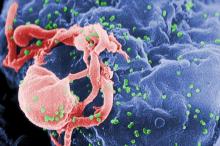HIV-infected patients in whom antiretroviral therapy has failed are not benefited by treatment regimens that include nucleotide reverse transcriptase inhibitors (NRTIs), as the drugs may not contribute to virologic suppression, a new study reports.
The study, published online in the Annals of Internal Medicine, suggests that treatment-experienced HIV-infected patients (those who have used antiretroviral drugs) may safely omit NRTIs from their drug regimens, which appears to contradict standard of care. However, this new research indicates that, because treatment-experienced patients have HIV isolates with mutations that significantly compromise NRTI activity, a treatment regimen omitting NRTIs is a real option if a new optimized regimen contains several fully or partially active antiretroviral medications with a continuous phenotypic susceptibility score greater than 2.0; the continuous phenotypic susceptibility score is a research measure of retroviral activity (Ann Intern Med. 2015 Nov;163. doi: 10.7326/M15-0949).
The study, called the OPTIONS (Optimized Treatment That Includes or Omits NRTIs) trial, was a multicenter, randomized, controlled trial in patients for whom current proteinase inhibitor–based therapy that included NRTIs had failed. Researchers, led by Dr. Karen Tashima of the Miriam Hospital and the Alpert Medical School of Brown University, both in Providence, R.I., compared treatment success between 360 HIV-infected patients who omitted versus added NRTIs with an optimized antiretroviral regimen of three or more agents.
A total of 93% of the randomly assigned participants completed a 48-week visit. The cumulative probability of regimen failure was 29.8% in the omit-NRTIs group vs. 25.9% in the add-NRTIs group (difference, 3.2 percentage points; 95% confidence interval, 6.1-12.5 percentage points). No significant between-group differences were found in the primary safety end points or the proportion of participants with HIV RNA level less than 50 copies/mL. No deaths occurred in the omit-NRTIs group, compared with seven deaths in the add-NRTIs group.
“The potential benefits of omitting NRTIs include reduced pill burden, reduced cost, and, probably, a decrease in NRTI-associated toxicity over the long term,” said Dr. Tashima and her coauthors. “These results have been incorporated in recent antiretroviral guideline recommendations for treatment-experienced patients.”
The study was funded by the National Institute of Allergy and Infectious Diseases, Boehringer Ingelheim, Janssen, Merck, ViiV Healthcare, Roche, and Monogram Biosciences.
Read the entire study on the Annals of Internal Medicine website.
On Twitter @richpizzi


